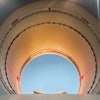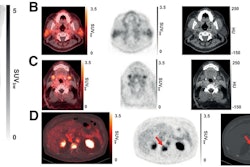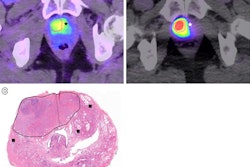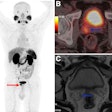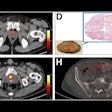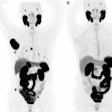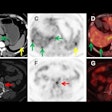PSMA-PET/CT has the potential to be an effective alternative imaging approach for diagnosing patients with renal cell carcinoma (RCC), a type of kidney cancer, according to a study published May 23 in the Journal of Nuclear Medicine.
In a meta-analysis of published studies, a group at Johns Hopkins University School of Medicine in Baltimore, MD, found that PET/CT using both gallium-68 (Ga-68)-based and F-18-based prostate-specific membrane antigen (PSMA) radiotracers had high detection rates for staging primary RCC lesions and restaging metastatic or recurrent disease.
“These findings suggest a new opportunity for improved detection of metastatic RCC using PSMA-targeted imaging agents,” noted lead author Moe Sadaghiani, MD, and colleagues.
RCC accounts for 90% of all primary renal malignancies and is the most lethal genitourinary cancer, as it often remains undetected during its early stages. Up to 30% of patients present with metastases at initial diagnosis, according to the authors.
The current gold standard method for evaluating patients is contrast-enhanced CT using F-18 FDG-PET/CT, but this technique is not sensitive or comprehensive enough to detect early metastatic lesions, particularly in small lesions or low-grade tumors, the group noted.
Alternatively, PSMA-PET/CT – a technique developed to visualize PSMA in prostate cancer patients – has shown promise in multiple preliminary studies in patients with RCC. Thus, to provide better insight into its role in assessing RCC, the group conducted a systematic review of these studies.
Using a comprehensive search strategy, the authors initially identified 145 articles. After exclusions, they focused on nine studies comprising 152 patients that provided the lesion-based detection rate for any PSMA radiotracers in patients with RCC.
According to the analysis, the pooled detection rate of PSMA-PET/CT in staging or evaluating primary RCC lesions was estimated to be 74% and its detection rate in restaging of metastatic or recurrent RCC was 87%.
In addition, an analysis based on the type of radiotracer showed a pooled detection rate of 85% for Ga-68-based PSMA tracers and 92% F-18 DCFPyL (Pylarify) PET/CT. Furthermore, based on two studies, F-18 DCFPyL PET/CT had a significantly higher detection rate of metastatic RCC than conventional imaging techniques.
“Our results revealed the potential role of PSMA PET/CT in the staging or evaluation of primary RCC lesions and in the restaging of metastatic or recurrent RCC,” the group wrote.
However, they noted that this was the first meta-analysis assessing the detection rate of PSMA-PET/CT in this patient population and as such, the results should be considered preliminary. Major limitations of the analysis included high heterogeneity among the studies, the small number of patients analyzed, lack of data on the location and size of RCC lesions, and the retrospective nature of most of the studies, they added.
“Large prospective trials with robust inclusion criteria and pathologic confirmation of lesions would be of value to validate the diagnostic efficiency of PSMA PET/CT in RCC,” the group concluded.
The full study is available here.



